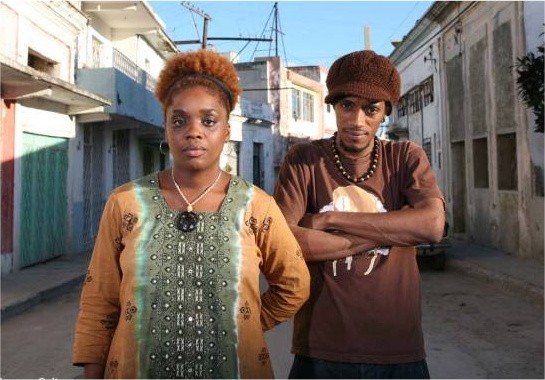
]
1. Cuban hip-hop cultural exchanges should happen more often
The music is incredibly infectious and there's a wealth of talent on the island nation, so why not? Los Van Van's performance at the Conga Room in downtown Los Angeles last month, plus the granting of a visa to Silvio Rodríguez last year suggests that a thawing in hardline stances against cultural exchanges may be taking place. For Obsesión, their set of tour dates, including last night's show in Anaheim were the first in the United States in over seven years. If music is the universal language, and hip-hop offers its own unique dialect, there's no reason why the artistic interchanges shouldn't flow more freely between both countries.
2. Hip-hop is an integral part of Cuban culture and music
Prevailing popular perceptions in the United States about Cuban culture and music usually doesn't include images of mostly Afro-Cuban youth rapping about their reality. Asked to think Cuba and cigars, rum, and vintage American cars come to mind for many. The ultra-compatibility of Afro-Cuban percussion rhythms with the universal backbone beats of hip-hop, however, produces a most unique sound that will open up a new way of seeing the culture of island. The musical movement has also introduced an important space for expression and poetry. Best of all, Cuban hip-hop obliterates the notion that conscious rhymes are incompatible with danceable songs and entertaining live shows. That was more than evident in the swaying hips and the the hip-hop hand waves in the audience during Obsesión's set.
3. In Cuba, there is racism.
Unlike the cliched saying, “En Cuba no hay racismo,” the lyrical content of Obsesión's masterful El Disco Negro illustrates how that's very much not the case. Last night, the group performed two songs in their set driving the point home taking on prevailing Eurocentric notions of beauty and dismissive attitudes towards Afro-Cuban rumba. For those who took the opportunity to buy the album from Obsesión, “Calle G” is another powerful song that demands that the statue of former President José Miguel Gómez be torn down for his historical role in oppressing blacks on the island. A similar album is needed from stateside hip-hoppers to pose a challenge the groundless notion of a 'post-racial' United States that gets pilfered out all too often.
4. The experience of the show itself!
As I mentioned in my introduction to this post, Cuban rap shows, especially on the West Coast, are far and few between. With that being the case, it's all the more pertinent for world music lovers and hip-hop heads alike to seize the moment whenever it arises. The only drawback to last night's performance at the Juke Joint is that there should have been more people in the audience. The fact is compounded by the reality that another chance to check out Obsesión may not come along for a very long time. But for the sake of good music and great live shows, let's hope that's not the case!
5. Some hard to get CDs
Obsesión's El Disco Negro is hands down one of my favorite albums of 2011. It illustrates that after forming 15 years ago, the group is still bringing the heat on the mic. The finely sculpted beats, transitions, interludes, and laser-like lyrical focus on Afro-Cuban consciousness featured on the collection should be made more widely available, especially since record labels seem to know of Obsesión's prowess. Some Cuban artists like Danay Suarez have their album's available on iTunes. For others, like Obsesión, the best opportunity to support and buy their music comes when they go on tour and set up their merchandise table after the show for blown-away audiences to come check out the goods.

Gabriel San Román is from Anacrime. He’s a journalist, subversive historian and the tallest Mexican in OC. He also once stood falsely accused of writing articles on Turkish politics in exchange for free food from DönerG’s!

